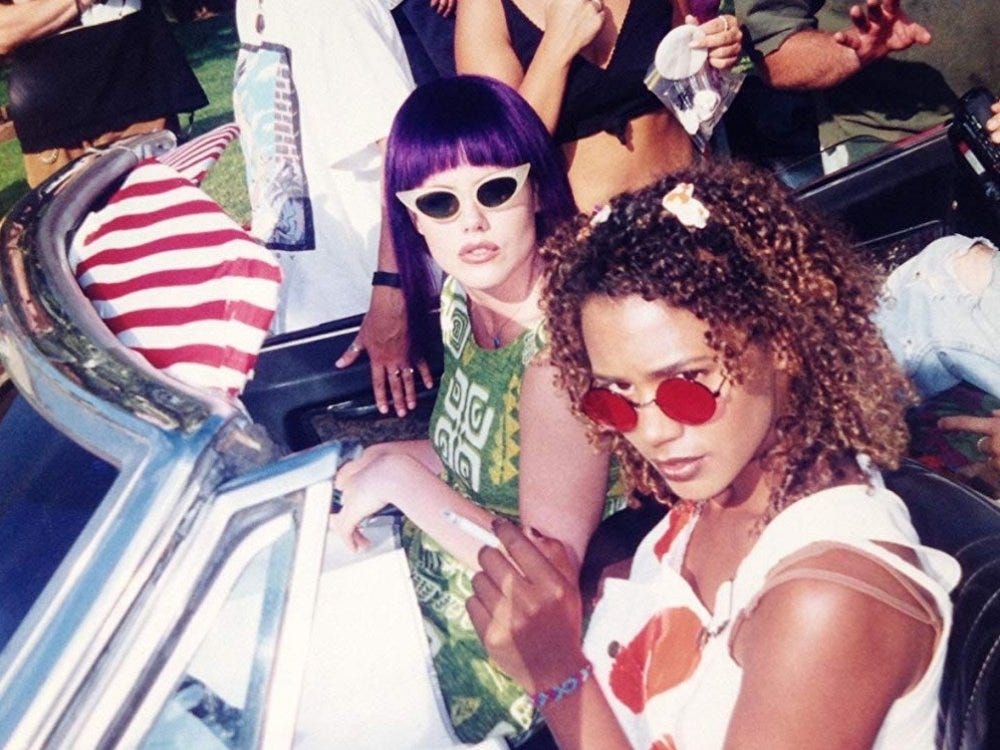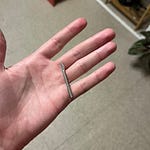As a Northern Californian, calling myself a pothead would be akin to stolen valor, but I do like to get high, and have ever since my first boyfriend bumped into my stepdad while buying me a piece at the only head shop in town, thus majorly blowing up my spot. But it occurred to me only very recently that a significant aspect of this pleasure—the pleasure of getting high—has to do with choice: By smoking, dropping, or snorting, I am choosing to change how I feel, sometimes almost instantly.
Sorry if this was already obvious to you, but, like, wow! The knowledge that I can interrupt or even end my thinking day whenever I want to feels good, almost as good as the chemicals that can energize or relax or disappear me. Now in my thirties, my standard 6pm edible represents, on some level, a clocking out of my salaried job, an act which due to white-collar American work norms doesn’t exactly exist. Everything after this point will be smudged, fuzzy, dull, gentle, creative, open, hilarious. Even if my boss Slacks me at 10pm asking for something, the quality of work I provide him will be subpar. This isn’t Don Draper’s all-day alcoholic buzz, or an “It’s 5 o’clock somewhere!” letting down of the proverbial hair. It’s an intentional depreciation of one’s own labor power, since one can’t totally demur without losing one’s job. Workplace sabotage is another story—this is passive aggression.
While not all of them are as adaptable to a 9-5 straight job as caffeine or even oui’d, the pleasure of any drug is not limited to a nonfunctional understanding of fun, because I’m starting to suspect that recreational drug use cannot be distinguished from functional drug use. Caffeine helps me do my jobs better (or at least makes doing them more psychically bearable), but I also enjoy the taste of coffee, and the smooth speed with which it stimulates my mind and boosts my mood. Other substances permit me to move beyond my shyness in social situations, or to stay awake late enough to socialize at nightclubs and bars, or to experience the world in different colors than I normally would.
I guess what I’m saying is that the reasons to become intoxicated are neither simple nor single, but getting to decide just how present I will be for the next 1-5 hours is one that I heretofore overlooked. The technology of the drug is not only about working better or feeling better, but having a say in how I work and feel (two things which, unfortunately, I cannot opt out of I want to continue living as I do). As important as it is to reiterate that “curing” addiction is not a matter of discipline, the pleasure of having control over one’s feelings tends to get lost in the necessary but tricky counter-narrative of addiction as something that no one chooses, or indeed can choose at all. Drugs serve as a regulation hack in a world littered not just with opportunities to be traumatized, but retraumatized by past trauma. Not everyone has the luxury of choosing whether drugs, some of them criminalized or habit-forming, are their best bet at self-regulation.
We know that drugs are consumed individually and collectively in that one’s choice to partake happens within a broader context of access, regulation, and criminalization. These choices are complicated by discourses of risk, ethics, and desire, among other things. A white person smokes a cigarette differently than a person of color smokes a cigarette, and our laws reflect/reinforce this; a white person undertakes to break the law by using illegal drugs differently than a person of color, and our laws reflect/reinforce this. What constitutes even a “drug” versus a substance, pleasure, or tool changes depending on who you are, where you live, how much money you have, whether or not you’re pregnant or have children, whether you’re disabled, whether you’ve been incarcerated, and whether and how that substance is also being used by white people as a group.
The mechanisms that influence whether we do or don’t do drugs—that is, mind/body-altering substances, although as “California sobriety” reveals, this is not a static or universal category—are manifold, extending beyond pleasure, physical dependency, and political rhetoric like “peer pressure.” Whether your drug use helps you to become a better subject under capital matters, too, because being a good subject is safer and more comfortable. A handy example might be Weimar Germany’s culture of permissive and easy drug use being eclipsed by Nazi propaganda in the 1930s promoting fascist ideals of health, beauty, and citizenship. But this shift didn’t result in a regime of wellness-cultivating teetotalers: By the end of the decade, “pharmaceutical production had pivoted away from opioids and cocaine and towards synthetic stimulants that could be produced entirely within Germany, per Nazi directive. The transition from cabaret cocaine to over-the-counter meth helped fuel what German journalist Norman Ohler in his new book Blitzed: Drugs in the Third Reich calls the ‘developing performance society’ of the early Nazi era, and primed Germany for the war to come.”
Drugs are contextual, is what I’m saying, which isn’t an original observation. But here in the 21st century—"post"-drug war and post-DARE and in the midst of the American opioid crisis, the legalization of marijuana, the increasing danger of party and street drugs, the lack of a health care system, the revisiting of criminalized drugs like ketamine as potential medical treatments, and moral panics about who is putting what chemicals in their body for what reason—what is that context, exactly?
It’s a big subject that can’t be covered in a few essays, but I’d like to scratch the surface over the next couple of DAVIDs. Luckily for me, there’s so much to draw from, from trans writers theorizing technologies of dissociation, queer writers exploring the overlap between political and sexual desires, and trans and queer artists and activists organizing and agitating for more rights and better services for drug users who are marginalized by criminalization, among other things.
I’ll close with a Foucault quote I found in Hannah Baer’s Trans Girl Suicide Museum, a book that is, among other things, a meditation on ketamine as a mediation of trans experience. (You can watch the interview here.)
“Deep down, what is the experience of drugs, if not this: to erase limits, to reject divisions, to put away all prohibitions, and then to ask oneself the question, what has become of knowledge? Do we then know something altogether other? Can we still know what we knew before the experience of drugs? Is this knowledge of before drugs still valid, or is it a new knowledge? This is a real problem and I think that in this measure the experience of drugs isn’t original in our society, it’s not a sort of little deviance that does not count. It seems to me that it is at the very heart of problems that the society in which we live—that is to say, in capitalist society—is confronted with.”
David tweets at @k8bushofficial.
Subscribe to support our mutual aid project, GOOD ADVICE/BAD GAY, an advice series from an anonymous gay therapist who’s not afraid to hurt your feelings with the truth. Sample an unlocked post for a taste of what you’re missing.















Share this post